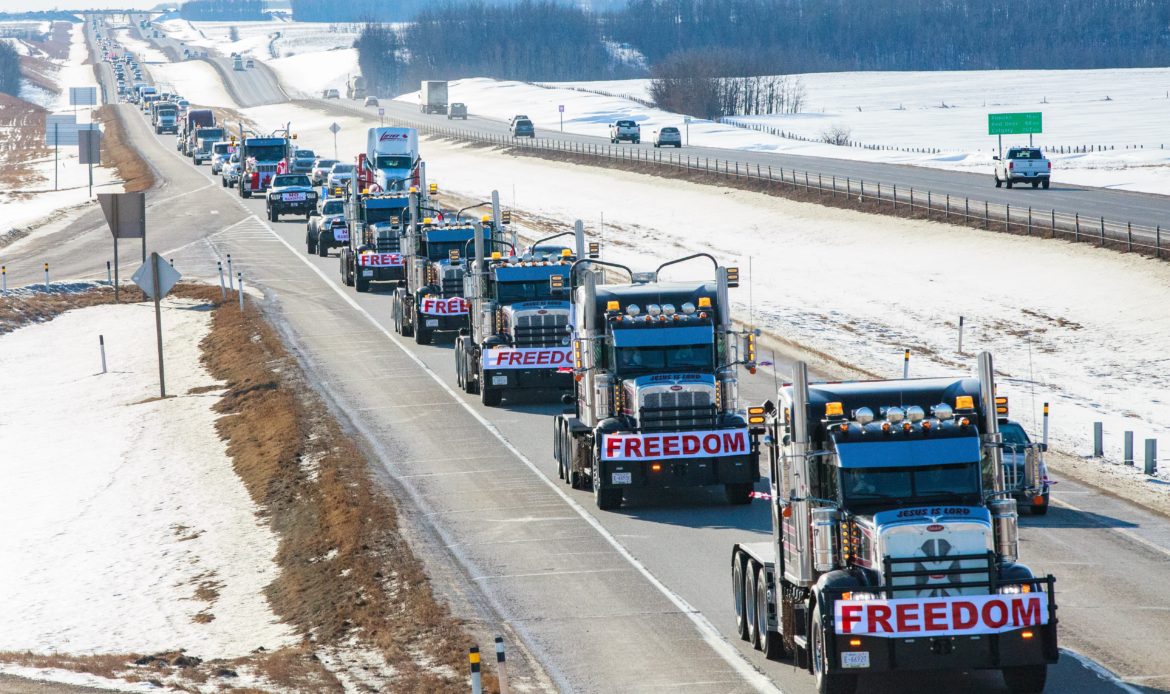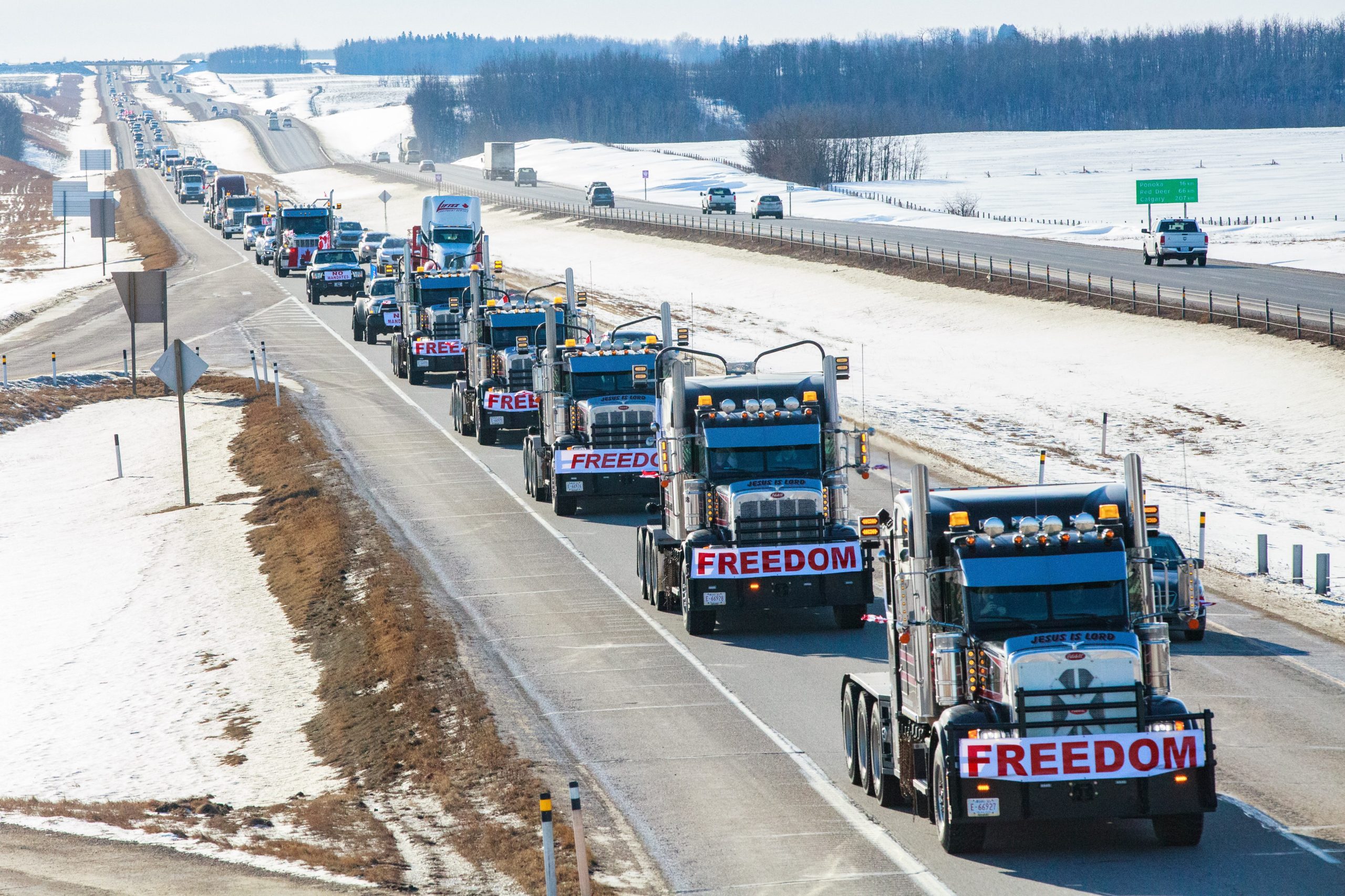OP-ED: Freedom Convoy 2022: What Actually Happened, and What We Can Learn

Looking back, it’s honestly shocking that a humble group of truckers, who began a convoy on January 23rd, 2022 to protest vaccine mandates, turned into such a hot-button national issue that Canadian politics are still feeling the effects of it today. The protests were loud, sure, but the Canadian government went so far as to label the entire movement as far-right and even invoke the Emergencies Act in a severe overreaction to the protests.
Contrary to what many politicians and people here on campus seem to believe, the fight against vaccine mandates is not far-right. As university students, we live in a very liberal environment, and we need to be aware of that and recognize the validity of other people’s political beliefs, even if they are in direct contradiction to our own. It’s perfectly fine that the population at U of T is largely liberal, but we need to be aware of our biases and understand what other people are thinking and feeling.
As mentioned, the protests began small. Canadian truckers had one goal: to protest a federal vaccine mandate for truckers crossing the border. Many truckers understandably felt that this kind of government regulation, targeting a very specific class of people, was unwarranted this late into the pandemic. It’s also worth understanding how the trucking industry works; generally, most truckers are self-employed contractors who own their own trucks. The federal legislation that requires unvaccinated truckers to quarantine for 14 days after returning to Canada was, therefore, essentially blocking them from working most of the time, affecting their livelihoods.
Once the truckers set out from Vancouver, they began journeying across the country to Ottawa and blockading Canadian-US border crossings. They arrived in Ottawa on January 28th amidst a firestorm of media attention. The truckers were loud, they made themselves known, and they were described by the Ottawa Citizen as “occupying” downtown Ottawa. Litigation began to make its way through the courts in order to allow Ottawa residents to resume their normal lives.
But that wasn’t enough for Prime Minister Justin Trudeau. From the start, he denounced the truckers as having “unacceptable views.” On February 16th, he took it up a notch, calling the protestors “swastika wavers.”
The truth of the matter is that there were far-right elements present at the trucker protests. That’s what happens when any protest swells to that size; there are bound to be extremist elements present who attempt to co-opt it. There were Confederate flags spotted, and there were some less-than-tasteful alterations made to statues in Ottawa. But if you talk to anyone who was actually among the protesters, they will likely tell you that it was mostly peaceful and non-extremist. For example, journalist Rupa Subramanya said, “I have spoken to close to 100 protesters, truckers and other folks, and not one of them sounded like an insurrectionist, white supremacist, racist or misogynist.”
As mentioned, Justin Trudeau wasn’t having any of it. He continued to label the entire protest as extremist in order to justify enacting the Emergencies Act, granting him sweeping powers to end the protests which had become a disaster for him politically. Protesters were forcibly removed, Ottawa Police were emboldened in their actions, even going so far as to discourage journalists from documenting what was happening in downtown Ottawa, and bank accounts and financial assets owned by the protest organizers and their donors were frozen.
The predecessor to the Emergencies Act, the War Measures Act, had only been invoked three times in Canadian history: during World War I, World War II, and the FLQ crisis, a domestic terror event in Quebec during the 1960s. Considering that there was significant backlash to the use of the Emergencies Act during a terrorism event, opposition to Trudeau’s use of it during the trucker protests is entirely warranted.
The use of the Emergencies Act during government opposition protests is alarming and an example of significant government overreach, which has taken place more than ever during the pandemic. Restricting movement, requiring vaccines for many normal activities, and mandating masks are just a few examples. It’s not about whether these policies are right or wrong; it’s about recognizing that the government exercised more power during the pandemic to regulate the lives of individuals, and still feels emboldened to do so.
It’s important that we actually understand what government power-grabs mean from a human perspective, instead of just blindly supporting moves like this because they are targeting people with beliefs that we don’t agree with. Even though there are people out there that have dissenting views, the government cannot go after them in such a targeted way. Everyone should be allowed to protest and express their ideas; in fact, Article Two in the Canadian Charter of Rights and Freedoms guarantees “freedom of thought, belief, opinion and expression” and “freedom of peaceful assembly.”
By the end of February, the trucker protests have wound down and the focus has shifted to other, frankly more important, global events. Trudeau did eventually revoke the Emergencies Act, but it took him ten days, which is frankly ten days too long. The truckers had already been cleared from Ottawa and were taking refuge at their aforementioned encampment in Arnprior, Ontario.
Looking back, there are some lessons to be learned. Namely, how did a protest over a small piece of government legislation turn into a global news event that pitted differing political ideologies against each other in such a confrontational way? There’s a sound argument to be made here that this was in fact a fight over nothing. 90% of Canadian truckers were already vaccinated when this vaccine mandate was enacted, and the Canadian Chamber of Commerce called out the federal government saying they had provided no clear evidence that truckers were significant sources of COVID-19 spread, which was used as justification for the mandate. And even if you are vaccinated, CNBC reported in January that five months after your second dose of Moderna or Pfizer, the vaccines are only 10% effective at preventing infection (while still being more effective at preventing serious illness and death).
Knowing all of this, it has to be asked: what were we even fighting over? I’d argue not a whole lot; this was merely a political ideology war that started with an honest attempt to protest but was co-opted by a political class and the media in order to smear and delegitimize their opponents. All of the fanfare and focus on the extremist elements ultimately distracted from the original goal: a small group of unvaccinated truckers just wanted to be able to cross the border and do their job, which is more important than ever amidst tremendous supply chain uncertainty.
As we emerge from the pandemic, the ultimate test of politicians will not be how they support those who voted for them, but rather how they engage with those who disagree with them. In light of the tremendous challenges we continue to face as a country and as a species, it is more important than ever to find common ground and de-escalate conflict instead of fighting it with force. That’s the lesson I hope we all can learn from not only the trucker protests but all of the political and social turmoil during the pandemic.
